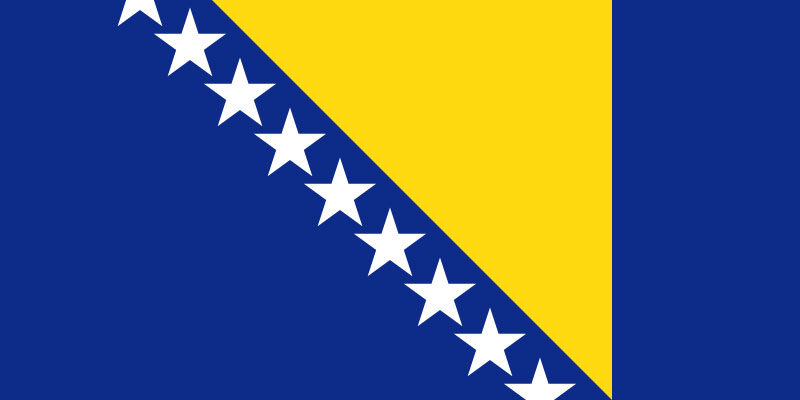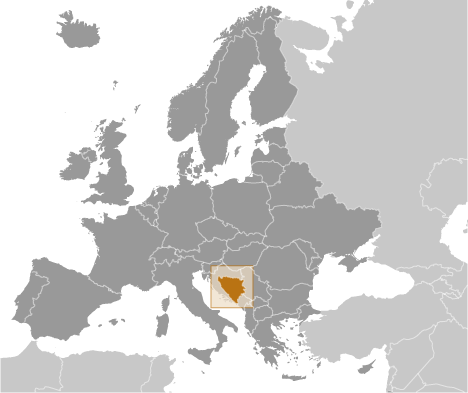HISTORICAL BACKGROUND
The Freedom of Access to Information Act (FoAIA) was adopted in July 2001 in Bosnia-Herzegovina and in the Republika Srpska in May 2001.(1) It went into effect in February 2002. The Act was adopted after Carlos Westendorp, the High Representative for Bosnia and Herzegovina, ordered that a freedom of information bill be developed by the Organization for Security and Co-operation in Europe (OSCE). A high-level group of international and national experts developed the draft bill in June 2000 based on some of the best practices from around the world.
The Act applies to information in any form held by any public authority including legal entities carrying out public functions. It also provides for a broad right of access by any person or legal entity, both in and outside of Bosnia. The request must be in writing. The government agency must respond in 15 days. However, the Act does not apply to international organizations, such as the OSCE, which effectively run the country.
Information can be withheld if it would cause "substantial harm" to defense and security interests, the protection of public safety, crime prevention and crime detection. Non-disclosure is also mandated to protect the deliberative process of a public authority, corporate secrets and personal privacy. A public interest test is applied to all exemptions.
Those who have been denied information can also appeal internally and challenge decisions in court. The Federation Ombudsmen and the Ombudsman of Republika Srpska can also hear appeals. In 2004, the Ombudsmen heard nearly 100 complaints, up from 30 in the first year and 60 in the second year. 90 percent of the cases were found to be justified and resulted in Ombudsman intervention and obtaining of the information. Eight recommendations against public authorities who refused to comply were issued resulting in compliance in five of the cases. In Republika Srpska, the Ombudsman received 138 complaints in 2004, up from 26 the previous year. Most were justified and resolved by the Ombudsman contacting the body.(2)
There have been many problems with implementation. The Federation Ombudsmen have dedicated a section in their annual reports on implementation of the FoAIA. The first, issued before the Act went into force called for Ministries to disseminate guides, a register and select information officers.(3) They described the situation of FOI in 2004 as "unequally and inconsistently applied, although, generally, it was somewhat more effectively applied than in the first two years of its application."(4) They describe the situation as "this right [is] often restricted, on one hand, due to lack of readiness of majority of governmental organs and, on the other hand, due to systemic non-harmonization of other laws with the Act." They found inconsistent interpretations by public bodies, a failure to evaluate the public interest based on unlawful class exemptions, and later legislation adopted by the Parliament that unlawfully restricts the right of access. According to the Ombudsmen, "certain public organs "do not feel themselves obliged" to apply the Act, since "no one instructed them to do so, or remind them to do so"". They recommended in 2005 that the laws be systematically reviewed to ensure harmony with the FOI.(5)
The Ombudsmen reported in December 2004 that only 142 public bodies were following the rules and recommended that the Ministry of Justice create a registry of all public bodies to improve awareness. They also recommended that the government require that public bodies produce their quarterly reports. In Republic Srpska, the Ombudsman reported that only a "couple" of bodies had properly prepared for the Act and many had not appointed information officers, created indexes or guides and are not aware of their obligations or have "wrongful understanding" of it. A 2005 review by the Center for Free Access to Information found that only 57 percent of bodies responded to requests.(6)
The OSCE Mission to Bosnia and Herzegovina held a regional conference in December 2004 and found that "municipal representatives have noted that many citizens are not aware of this legislation, as the number of requests for information was minimal."(7)
The Law on the Protection of Personal Data was enacted in December 2001. It allows individuals to access and correct files containing their personal information held by public and private bodies. It is enforced by a Data Protection Commission.
The Criminal Code prohibits the disclosure of state secrets. Violations can be punished for up to five years imprisonment.(8) There is a public interest exemption if the person does it "with an aim of disclosing to the public facts which constitute a violation of the constitutional order or of an international agreement, provided that the making public does not undermine the national security of Bosnia and Herzegovina." The Ombudsmen issued a critical report of the Public Information Acts in Sarajevo and Una-Sana for overly broad prohibitions on publishing on information that would "jeopardize state secrets."(9) In 2002, the Ombudsmen recommended against the release of intelligence files related to candidates for the upcoming election.(10)
2004 freedominfo.org Global Survey Results - Bosnia and Herzegovina
NOTES
1. Freedom Of Access To Information Act For The Federation of Bosnia and Herzegovina, July 2001; Freedom Of Access To Information Act For The Republika Srpska, 18 May 2001.
2. Ombudsman of Republika Srpska, Annual Report 2004.
3. Ombudsmen of the Federation of Bosnia and Herzegovina, Recommendation for the implementation of the freedom of access to information act, Sept 2001. http://www.bihfedomb.org/eng/reports/special/secretfiles.htm
4. See Ombudsmen of the Federation of Bosnia and Herzegovina, Right to Free Access to Information Human Rights Protection and Media Freedoms. Annual Report for 2005, May 2005. http://www.bihfedomb.org/eng/reports/2003/rpt2003mediafreedom.htm; See also Citizens' Rights to Information and Situation in the Area of Journalistic Freedoms. Annual Report for 2002, March 2003. http://www.bihfedomb.org/eng/reports/2002/rpt2002media.htm
5. Special report on non-harmonisation of the Criminal Procedure Code and the Law on Tax Administration with freedom of access to information act for FBiH - following drawing attention of the Government of the Federation of BiH and the Ministry of Justice of the Federation of BiH at this fact, 27 June 2005.
6. Homepage: http://www.cspi.ba/index2.html
7. OSCE Statement by the Spokesperson, Access to information for the BiH public, 1 December 2004.
8. Criminal Code of Bosnia and Herzegovina 2003 §§ 163-164.
9. Special report on violation of media freedoms through legislation on public information and media in Canton Sarajevo and Una-Sana Canton, 23 December 2003. http://www.bihfedomb.org/eng/reports/special/lawchange.htm
10. Ombudsmen of the Federation of Bosnia and Herzegovina, Recommendation for the implementation of the freedom of access to information act (2). http://www.bihfedomb.org/eng/reports/special/secretfiles2.htm





















